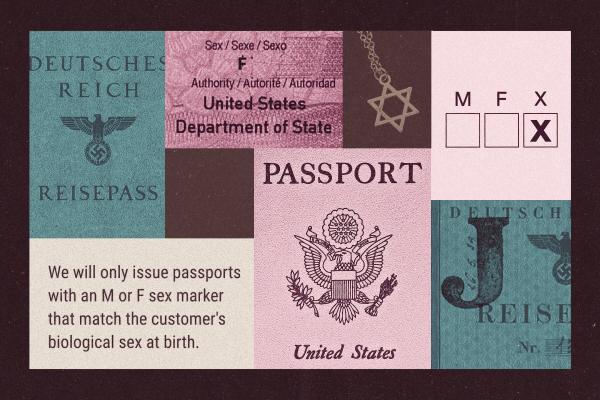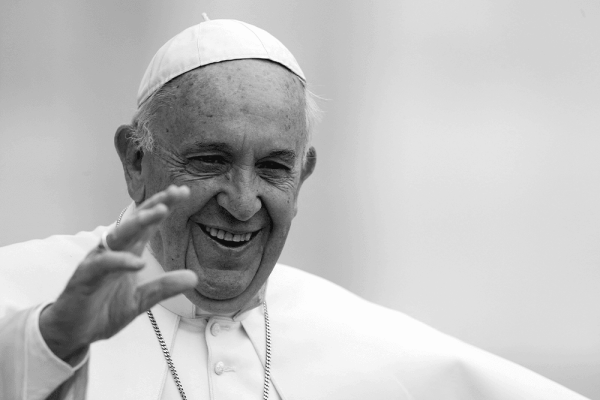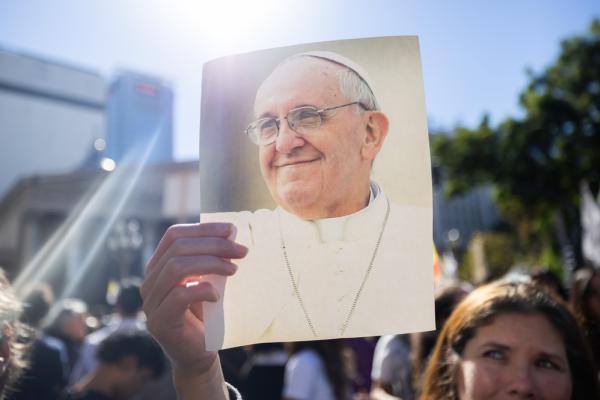The Rev. Cleophus Smith gets choked up when he recalls the Rev. Martin Luther King Jr.’s last sermon.
The 75-year-old sanitation worker remembers the contrast on that day five decades ago between the weather outside the historic church and the future King was painting with his sermon inside.
“It was just raining real hard that particular night that he made that last ‘Mountaintop’ speech at Mason Temple,” Smith said of the civil rights leader’s Apr. 3, 1968, sermon at the Church of God in Christ headquarters on the day before he was assassinated. “From the speech he made, we had hope that there was going to be a brighter day ahead.”
Fifty years later, as the world’s eyes turn again toward Memphis, people of faith who are passionate about racial and economic justice are recalling what was and wondering what yet could be. Historic sites across downtown Memphis are getting an influx of visitors who want to see the sites where King preached and died.
Many want to see where 1,300 black sanitation workers protested, because that’s what brought King to their city. And some groups that worked together in the ’60s — faith and union leaders — are joining forces again to seek better working conditions for the nation’s laborers.
Smith sits at the intersection of all of that — hopping on and off a truck he drives five days a week to collect garbage, even as he spends much of the rest of his time as an associate minister of his Baptist congregation.
The tall lean man, dressed in a brown jacket and tie — and a hat he bought at a thrift store — rattled off street names that he’d come to know along sanitation routes.
He is one of two surviving sanitation workers who were involved in the two-month Memphis strike and remain on the job.
To him, the continuing struggle for better conditions for sanitation workers is a spiritual one.
“We are fighting for the betterment of mankind, if I might put it that way,” Smith said, in his gentle Southern drawl, during an interview at the headquarters of Local 1733 of the American Federation of State, County and Municipal Employees.
The “MLK50” events are bringing renewed attention to campaigns for equal pay and a higher minimum wage, while prompting faith leaders toward renewed and unified steps on economic issues, said Pastor Linwood Dillard, a planning coordinator for the I Am 2018 initiative that is spearheaded by the Church of God in Christ, an African-American Pentecostal denomination, and AFSCME.
webrns-cleophus-smith19-032817.jpg
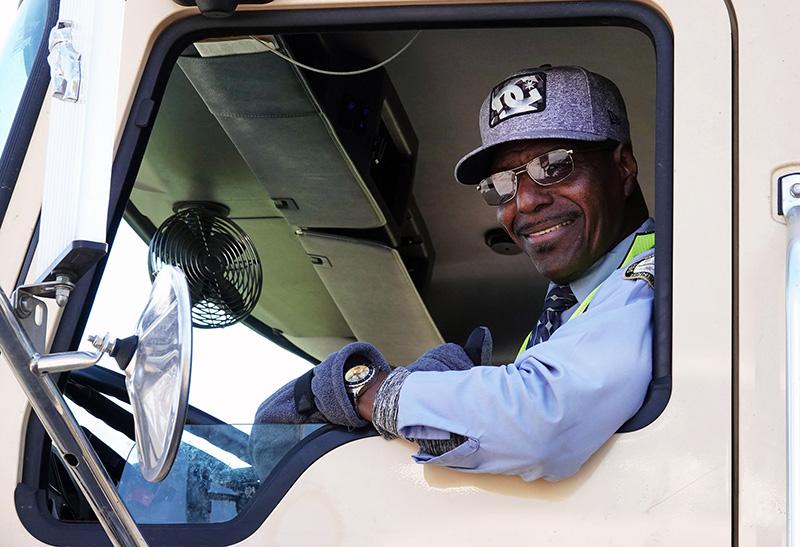
“Some people wouldn’t believe that there are yet some workplaces that don’t have plausible working conditions for the workers and laborers,” said Dillard in an interview at his Memphis church. “Many of our parishioners are impacted and affected by the plight of inequality or injustice.”
Dillard’s maternal grandfather, who died the year before Dillard was born, was among the striking sanitation workers. Dillard’s mother, Lorsie Dillard, still recalls how her dad, Eddie Bowling Sr., was suddenly at home and not traveling the 30 miles from Collierville to Memphis during the strike.
“He was basically telling us, ‘Make sure you go to school. You don’t want to be working like I’m working and have to go through what I’m going through,'” she said in an interview after attending a recent Sunday service at her son’s church. “He didn’t go into detail what it was but he did tell us that this man, which is Martin Luther King, was coming down to help them.”
Smith did give a detailed description of his early days as a sanitation worker, when garbage was not yet placed at the curb. He had to walk to the back of houses to retrieve it, transferring the waste from a 50-gallon drum to a washtub in which he had punched holes to allow some of the excess liquid to drain.
“We would let it sit there on the ground ’til the water would drain out as to where we could pick it up, put it on our shoulders, tote it to the truck, dump it — juice and garbage juice running down our backs — go back and that’s the way we worked for eight hours,” he said. “When we got off from work, many of us didn’t have transportation to get home. They wouldn’t let us ride the bus. We had to walk.”
Linwood Dillard and Smith were among the clergy at a rally this past Feb. 24 at historic Clayborn Temple, the church building from which sanitation workers marched 50 years ago with their iconic “I Am a Man” placards. The rally, featuring union leaders and grass-roots activists, was one of dozens held across the country that day. It followed earlier observances of a moment of silence on Feb. 1, in honor of sanitation workers Echol Cole and Robert Walker, on the anniversary of their being crushed to death when their truck’s compactor malfunctioned.
Smith gave the invocation at his Memphis local’s remembrance of his colleagues and was recognized at Clayborn Temple a few weeks later.
Dillard expressed admiration for Smith’s continuing dedication to the causes being highlighted in the anniversary events.
“He was a recipient of the inequality and the poor working conditions and a man of God and understood that he had to stand up for not just himself but those around him and for generations to come,” said Dillard.
“Some people, they think about the past, they get enraged. But I think he really appreciates where we’ve come from.”
Smith, an elementary school dropout who started as a Memphis sanitation worker in 1967 after leaving the cotton fields of his home state of Arkansas, said he was a much angrier man before he committed to his faith. He also credits Providence for his ability to read. He said his Sunday school teacher’s prediction that he would one day be able to read gradually became a reality starting in the 1970s, when he committed to Jesus, soon felt called into the ministry and was ordained in a Church of God in Christ congregation.
Now, he serves as an associate minister at Eternal Peace Missionary Baptist Church, where he could be seen proclaiming words from the Bible, holding the large tome in his hand as the Rev. Maurice Hunt read from the Gospel of John about putting Jesus first: “He must increase, but I must decrease.” Hunt calls Smith a “strong help,” moving from church pew to hospital bed assisting members of their congregation by serving Communion or teaching a Bible lesson.
“I see him as a pioneer or a trailblazer that has strong spiritual ties that speaks well of his commitment to the cause and that effort to try to stand for the truth and justice and equality,” said Hunt.
webrns-cleophus-smith08-032817.jpg
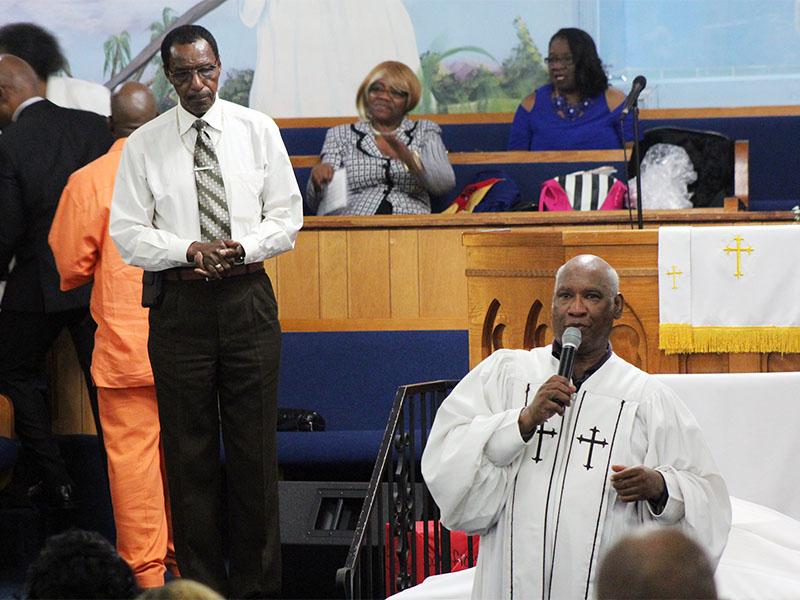
Smith said he still has an “I Am a Man” protest sign: “Yes ma’am. And I am a man.”
Those signs, intended for peaceful rallying, were in use on March 28, 1968, when King led a march that turned violent.
“Everything just went haywire,” Smith recalled. “We were sprayed with water hoses, tear gases, billy clubs.”
King was determined to return to Memphis and prove a peaceful protest was possible. But he was killed by an assassin’s bullet before he could march again.
The civil rights leader’s last encouragement to the workers came in his “I’ve Been to the Mountaintop” sermon. Citing a familiar biblical story, he compared their plight to the need for the good Samaritan to help a man who had been robbed and left at the side of the road.
“The question is not, ‘If I stop to help this man in need, what will happen to me?”’ King preached. “The question is, ‘If I do not stop to help the sanitation workers, what will happen to them?’ That’s the question.”
The expectation Smith felt on Apr. 3 as he listened to King’s sermon was snuffed out the next day.
“The only thing I could think of was that all hope was gone,” he said, of the moment he learned that King had been shot.
But, decades later, he no longer feels that way.
“No, no, no, ’cause we can fight,” he said. “We’re going to keep the dream alive and we’re going to move forward.”
He’s gradually been able to improve his living conditions — moving away from the projects, saying “the Lord fulfilled my dream” to live in a more desirable neighborhood.
And he thinks he sees some of King’s vision for the future when he walks into churches and sees a rainbow of people gathered at events to hear his story or determined to improve workers’ lives.
“This is one of Dr. King’s dreams, that he’d see the day that all nationalities and colors would come together, white and black and Hispanic,” he said. “So this is a dream that has been fulfilled.”
The Rev. Christopher Davis, associate dean of doctoral studies at Memphis Theological Seminary, said 50 years after King’s assassination, houses of worship of a wide range of faiths and racial makeups are much more inclined to celebrate the prophetic tradition King espoused. In the past, he said in a phone interview, “there were some who believed that there was no place for politics within the pulpit.”
But five decades later there is a change in attitude, with black and white churches in Memphis planning a joint Holy Saturday worship service and concert the day before Easter and four days before the assassination anniversary.
“Who wants to be on the wrong side of history?” asked Davis, who is also the pastor of a Memphis Baptist church.
Within days of King’s death, the Johnson administration pressured city officials to reach a strike settlement, which occurred on Apr. 16. And, over time, Smith has seen improvements.
He used to have no vacation and only got Christmas Day and the Fourth of July off. Now, he gets five weeks of vacation because of his length of service and a total of 13 holidays, including the one honoring King.
“We have all our working equipment given to us now, such as safety working shoes, safety working gloves, safety eyeglass goggles, safety helmets, uniforms,” he said.
He often changes out of his uniform and puts on church clothes to go on visits after his shift.
Yet, he acknowledges there is more work to do, and that’s part of the reason he stays on the job — in addition to needing to support his family.
Just last year, workers obtained a retirement plan from the city, but Smith said: “It won’t benefit me. But it will benefit the younger generation that’s out there now.”
He foresees a day when he’ll retire — but guesses it’s still several years off — when more victories have been won. Until then, he continues to share his story with everyone from up-and-coming activists to President Obama in hopes of continuing to achieve justice for workers like himself.
“I’m looking forward, maybe when I turn 80,” he said. “Hopefully … people will be coming together and then I can just sit back and say, ‘Lord, I thank you for bringing it to pass.'”
Got something to say about what you're reading? We value your feedback!


